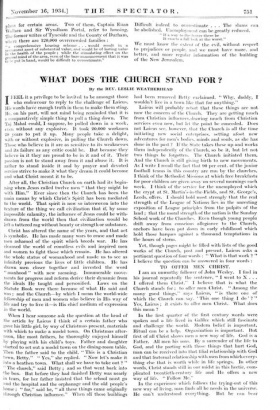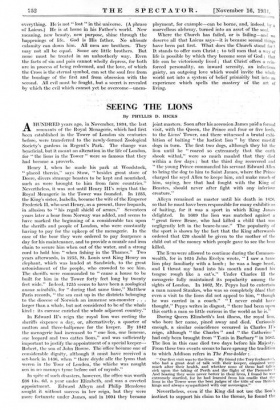WHAT DOES THE CHURCH STAND FOR
By the REV. LESLIE WEATHERHEAD
y FEEL it a privilege to be invited to be amongst those I who endeavour to reply to the challenge of Laicus. His words haVe enough truth in them to make them sting. He, on his part, will not mind being reminded that it is a comparatively simple thing to pull a thing down. The Taj Mahal . could, I- suppose, be pulled down in a week, even without any explosive. It took 20,000 workmen 20 years to put it up. Many people take a delight, with or without explosive, in pulling the Church down. Those who believe in it are as sensitive to its weaknesses and its failure as any critic could be. But because they believe in it they are proud to be in it and of it. Their passion is not to stand away from it and abuse it. It is rather to stand inside it and by prayer and devoted service strive to make it what they dream it could become and what. Christ meant it to be.
After all, the Christian Church on earth had its begin- ning when Jesus called twelve men " that they might be with Him." Ever since then the Church has been the main means by which Christ's Spirit has been mediated to the world. That spirit is now so interwoven into the texture of the thing we call civilization that if, by some impossible calamity, the influence of Jesus could be with- drawn from the world then that civilization would be. left a tattered rag without beauty or strength or substance.
Christ has altered the name of the years, and that act is symbolic. He has made many wars to cease and made men ashamed of the spirit which breeds war. He has cleansed the world of countless evils and inspired men and women to fight those which remain. He has altered the whole status of womanhood and made us to see as infinitely precious the lives of little children. He has drawn men closer together and invested the word " manhood " with new meaning. Innumerable move- ments for progress and reform derive their dynamic from the ideals He taught and personified. Laws on the Statute Book were there because of what He said and was ; and the Church—by which I mean the world-wide fellowship of men and women who believe in His way of life and try to live it—is- His chief medium of expression in the world.
When I hear someone ask the question at the head of the article by Laicus I think of a certain father who gave his little girl, by way of Christmas present, materials with which to make a model town. On Christmas after- noon, like' most fathers, he thoroughly enjoyed himself by playing with his child's toys. Father and daughter started to set out a model town on the dining-room table. Then the father said to the child, " This is a Christian town, Betty." " Yes," she replied. " Now let's make -it into a heathen town. What shall we have to take out ? " " The church," said Betty ; and so that went back into the box. But before they had finished Betty was nearly in tears, for her father insisted that the school must go and the hospital and the orphanage and the old people's home ; " for," said he, " all these things came originally through Christian influence." When all these buildings had been removed Betty exclaimed, " Why, daddy, I wouldn't live in a town like that for anything."
.Lafeus will probably retort that these things arc not now the concern of the Church. They are getting much from Christian influences, drawing much from Christian services even now, but let the point be conceded. Does not Laicus sec, however, that the Church is all the time initiating new social enterprises, setting afoot new adventures for men's bodies, minds and- souls, as she has clone in the past ? If the State takes these up and works them independently of the Church, so be it, but let not two things be forgotten. The Church initiated them. And the Church is still giving birth to new movements. As I write I recall the fact. that 90 per cent. of the junior football teams in this country are run by the churches. I think of the Methodist Missions at which free breakfasts for poor children are given away on several mornings each week. I think of the service for the unemployed which the crypt at St. Martin's-in-the-Fields, and St. George's, Leeds, offers. I should hold most strongly that the real strength of the League of Nations lies in the =resting exposition of League principles from the pulpits of the land ; that the moral strength of the nation is the Sunday School work of the Churches. Even though young people drift away from conscious allegiance to the Church, anchors have been put down in early childhood which hold those barques against a thousand temptations in the hours of storm.
Yet, though pages might be filled with lists of the good works of the Church, past and present, Laicus asks a pertinent question of four words : " What is that work ? " I believe the question can be unswered in four words : TO OFFER MEN CHRIST.
I am an unworthy follower of John Wesley. I find in his journal repeatedly the sentence, " I went to X . . . I offered them Christ." I believe that is what the Church stands for ; to offer men Christ. " Among the many good things," says Laicus, " is there one of which the Church can say. ' This one thing I do ' ? " Yes, Laicus ; it exists to offer men Christ. What does this mean ?
In the first quarter of the first century words were spoken and a lift lived in Galilee which still fascinate and challenge the world. Modern belief is important. Ritual can be a help. Organization is important. But first of all Christ shows men a new way of life. God is a Father. All men his sons. By a surrender of the life to God, and the parting with those things that hurt God, man can be received into that filial relationship with God and that fraternal relationship with men from which every- thing else that is worth while in life springs. In other words, Christ stands still in our midst in this hectic, com- plicated twentieth-century life and He offers a new way of life. " Follow Me."
In the experience which follows the trying-out of this new way of living, man finds all he needs in the universe. He can't understand everything. But he can bear everything. Heys not " lost "'in the universe. (A phrase of Laicus.) He is at home in his Father's world. New meaning, new beauty, new purpose, shine through the happenings of life. God is His father. No ultimate calamity can down him. All men are brothers. They may not all be equal. Some are little brothers. But none must be treated in an unbrotherly way. Even the facts of sin and pain cannot= wholly depress, for both are in process of being redeemed, and the love, of which the Cross is the eternal symbol, can set the soul free from the bondage of the first and from 'obsession with the second. All evil must be fought,. but a secret is revealed by which the evil which cannot yet be overcome—unem- ployment, for eximple-7-can be borne,, and,. indeed, by a marvellous alchemy, turned into an asset of the soul. • Where the Church has . failed, or is failing=and we deserve all that Laicus saYsit is because 'second things have been put first 'What does• the Church stand for? It stands to offer men Christ ; to tell men that a way of life is possible. by which they become sons 'of God ; that life can be victoriously ; that Christ offers a rein- forced personality, an 'inward serenity,. an infectious gaiety, an outgoing, love which would_inVite the whole world not into a system of belief ,prinidrily but into an experience which spells the mastery- • Of the art of living.







































 Previous page
Previous page